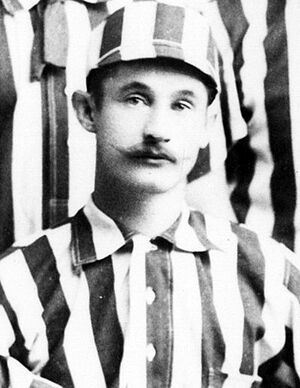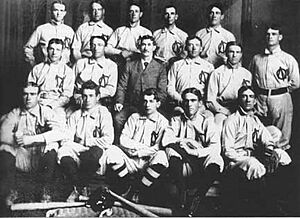Abner Powell facts for kids
Quick facts for kids Abner Powell |
|||
|---|---|---|---|

Powell in 1890
|
|||
| Pitcher | |||
| Born: December 15, 1860 Shenandoah, Pennsylvania |
|||
| Died: August 7, 1953 (aged 92) New Orleans |
|||
|
|||
| debut | |||
| August 4, 1884, for the Washington Nationals | |||
| Last appearance | |||
| October 13, 1886, for the Cincinnati Red Stockings (AA) | |||
| MLB statistics | |||
| Wins–Losses | 8-18 | ||
| Earned run average | 4.00 | ||
| Strikeouts | 97 | ||
| Teams | |||
|
|||
Abner Charles Powell (born December 15, 1860 – died August 7, 1953) was a baseball player. He played in Major League Baseball. Abner was a member of the Washington Nationals in 1884. He also played for the Baltimore Orioles and the Cincinnati Red Stockings in 1886. Besides playing, he managed and owned several baseball teams. Abner Powell is most known for his new ideas as a manager.
About Abner Powell
Abner Powell was born in Shenandoah, Pennsylvania. He lived a long life. He passed away in New Orleans when he was 92 years old.
Baseball Innovations
Abner Powell is often given credit for many new ideas in baseball. Some of these ideas changed the game. However, it is important to know that some of these ideas were already around. Powell often improved on existing ideas.
For example, people sometimes say he invented "rain checks." A rain check lets you use your ticket for another game if a game is stopped by rain. But rain checks were used in New Orleans before Powell. What Powell did was make the system better. He added a special part to tickets that could be torn off. This made sure only people who bought tickets could get a new one. This stopped people who snuck in from getting free tickets.
Another idea often linked to Powell is "Ladies' Day." This was a special day when women could get into games for free or at a lower price. The goal was to make baseball a family event. It also helped make the stands a safer place for everyone. This idea was used in New Orleans as early as 1880. Powell started having regular Ladies' Day events in 1887.
Powell is also known for using a large cover, called a tarpaulin, on the infield. This cover protected the field from rain. It helped make sure the field was ready to play on right after a rainstorm. This was a big help for keeping games on schedule.
 | James Van Der Zee |
 | Alma Thomas |
 | Ellis Wilson |
 | Margaret Taylor-Burroughs |


